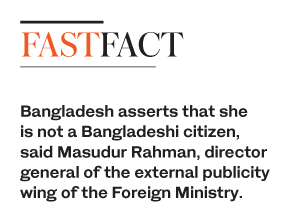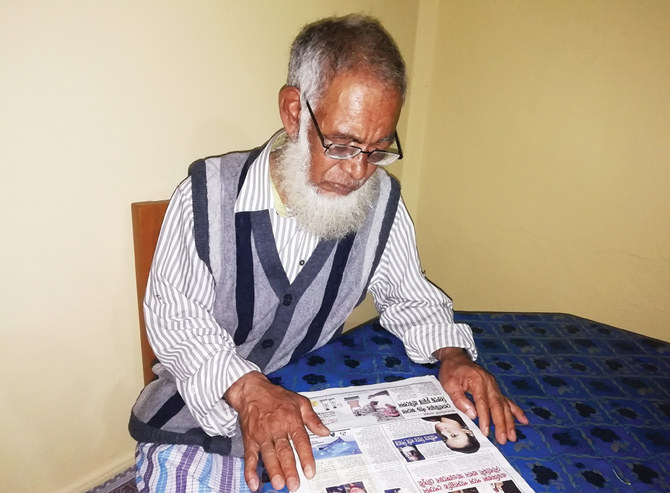DHAKA: The father of Shamima Begum, the British teenager of Bangladeshi descent who ran away to join Daesh in Syria, said his daughter’s British citizenship should be restored, and asked that she be allowed to return to the country.
In 2015, Shamima Begum left her parents’ home in the Bethnal Green district of London to travel to Syria along with two of her friends. All three went on to marry Daesh fighters there.
Begum married a Dutch member of Daesh, and lived with him in the group’s territory for four years. In that time, she gave birth to two children, both of whom died of malnutrition.
Last week, her third child died in a detention camp in Syria, where Begum is now living.
Begum has repeatedly stated that she wants to return to London, but UK Home Secretary Sajid Javid has revoked her citizenship. He has suggested that Begum should go to Bangladesh, her country of origin.
Her family has insisted that Begum is not a dual citizen of the UK and Bangladesh. Her case is currently pending in the courts.
“Shamima is a British citizen by birth and has never visited Bangladesh, so there is no question of bringing her to Bangladesh,” Begum’s father, Ahmed Ali, told Arab News in an interview on Tuesday evening at his home in the village of Sunamgonj, some 200 km from the Bangladeshi capital of Dhaka.
“My wife Asma Begum also appealed to the UK authorities on Monday to restore Shamima’s citizenship and bring her back,” he added. “I would like to visit the UK to join with my wife to fight the legal battle to the last.”
Ali said he and Asma had not yet decided if they would apply for Bangladeshi citizenship for their daughter.
On March 11, Asma Begum appealed to the British home secretary to “reconsider” her daughter’s citizenship.
Her attorney, Dr. Farooq Bajwa, said in the petition: “Mrs. Begum requests this reconsideration as an act of mercy, on the basis of the following new information, namely the death of her newborn son as reported by the BBC on 8 March, 2019.”
The petition continued: “As far as we are aware, the British government did not ask for the views of, nor consult with, the government of Bangladesh on whether or not Shamima used to hold dual nationality before the decision of depriving (her of) citizenship.”
Masudur Rahman, director general of the external publicity wing of the Bangladesh Foreign Ministry, said the government was “deeply concerned that Shamima has been erroneously identified as a holder of dual citizenship.”
“Bangladesh asserts that she is not a Bangladeshi citizen,” he told Arab News.
“She is a British citizen by birth and has never applied for dual nationality with Bangladesh. She never visited Bangladesh in the past despite her parental lineage. So, there is no question of her being allowed to enter Bangladesh.”
In interviews last month, Begum said she wanted to return to Britain but also played down the severity of Daesh’s crimes and said she did not regret joining the caliphate.
Her remarks have sparked a debate in the West about whether governments have a responsibility to repatriate their citizens who joined Daesh. Thousands of foreign Daesh fighters are currently being held in detention facilities in Syria and Iraq.
Begum’s father said his daughter deserved to be allowed to return to the UK because she was just 15 when she fled home. He described her as “simple and naïve” and easily trusting of people.
“It was a total brainwash,” said Ali, who moved back to Bangladesh from London more than two decades ago and lives there with his second wife.
 He described Begum, the youngest of four daughters, as an introvert who focused on school but was “modern and progressive” and resisted attending religious gatherings.
He described Begum, the youngest of four daughters, as an introvert who focused on school but was “modern and progressive” and resisted attending religious gatherings.
“I didn’t notice anything abnormal in Shamima even during the last meeting I had with her just two months before her joining Daesh,” Ali said.
“We discussed some family affairs and she was the same, just like other girls of her age.
“Even on the day of her disappearance, her mum accompanied her to catch the bus to her school. And after a few hours that very day, sitting in Bangladesh, I (learned) that Shamima had left the UK to join (Daesh).”
Ali also suggested that Begum’s school and British immigration were, in some respects, culpable for his daughter’s predicament.
“One month before Shamima’s disappearance along with her two classmates, another girl from the same school and same class had fled and joined Daesh,” Ali claimed.
“What did the school do during this period to counsel their students? And how did a teenager like Shamima (get past) British immigration authorities with a fake passport and a different identity?”
He added that he believed Shamima should be questioned by a neutral body, free from the influence of Syrian authorities.
Barrister Tanjibul Alam, a renowned Bangladeshi immigration and human rights lawyer, said the UK could not render Begum “stateless.” He said that the UK’s decision to revoke her citizenship was “contrary to British convention and quite unprecedented,” calling it a “racially biased decision.”
Alam said that even if the British Home Office denied Shamima’s latest mercy petition, she could then file an appeal with the High Court.
“If (her appeal is) rejected by the High Court, she will still have the option to continue the legal battle with the Court of Appeal and the Supreme Court,” Alam said, adding that her parents also needed to apply for her Bangladeshi citizenship.
Barrister Rumin Farhana, assistant international affairs secretary of the Bangladesh Nationalist Party (BNP), said that, according to Bangladesh’s citizenship laws, the government would have to accept Begum’s application for citizenship because her parents were originally from Bangladesh.
“There is no question of choice in this regard,” Farhana told Arab News.
“Her citizenship would have been automatically canceled due to having British citizenship. But, in this case, Shamima (is eligible for) Bangladeshi citizenship since she is below the age of 21.”


























